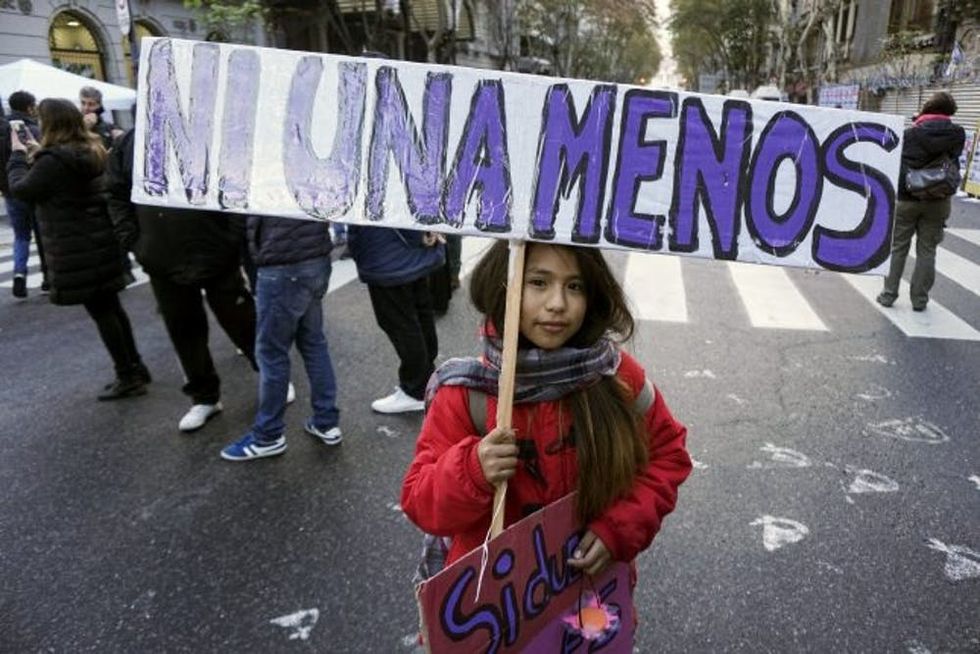After Decades of Women’s Advocacy, Argentina May Be on the Verge of Legalizing Abortion

Another country is on the verge of potentially legalizing abortion. Just weeks after Ireland voted to repeal its anti-abortion laws, the lower house of Argentina’s Congress is voting today on whether or not to follow suit in legalizing abortion. The vote comes after decades of abortion rights advocacy in the country.
While the right to legal abortion would drastically improve quality of life for women in Argentina, it remains a controversial issue in a country that remains largely Catholic (the current Pope’s home country is Argentina) and socially conservative.
Currently, abortion is completely illegal in Argentina with exceptions made for rape, or if the life of the mother is at risk. The process to obtain legal permission can be long, and many women simply can’t or don’t want to wait. If someone is found to have had an abortion illegally, they can be imprisoned for up to four years. Still, illegal abortion is quite common in Argentina. According to the Los Angeles Times, there are between 370,000 and 522,000 abortions in Argentina each year.

The bill the lower house of Congress votes on today would make abortion legal up to 14 weeks. Left-leaning politicians have tried to pass this bill several times in recent years, but never successfully. This time, 71 members of Congress, some of them on the center-right, have signed on, igniting new hope for legalized abortion.
Women’s rights advocates have long waited to see the right to abortion made policy. Valentina Brishantina, a 23-year-old performance artist in Buenos Aires, the capital of Argentina, tells Brit + Co that having access to legal abortion would be “absolute bliss.”
“We are sick of women dying or having [induced] complications to not be pregnant,” says Brishantina. “It’s f*cking bullshit.” In 2015 and 2016 alone, a minimum of 98 women died during botched illegal abortion procedures in Argentina, according to the New York Times.
But abortion itself is not the only imminent danger women in Argentina face: The nation also has one of the highest rates of femicide — the gender-motivated killing of women — in the world. A woman is killed approximately every 30 hours in Argentina, and sometimes these murders involve pregnancy and attempted abortion.

In 2015, the body of a 14-year-old teen girl, Chiara Paez, was found in her boyfriend’s family’s yard. Paez had been pregnant, and a post-mortem examination of her body found traces of an abortion medication. Chiara had been badly beaten and was buried alive before she died. Her boyfriend and his family were suspected to be involved in her murder, and there was speculation that there had been a fight over Chiara having obtained an abortion.
Her murder was the catalyst for a widespread feminist movement that has come to prominence in Argentina, called Ni Una Menos. Ni Una Menos (which translates to Not One [woman] Less), is an anti-femicide movement and feminist collective that advocates for women’s rights. LGBTQ+ rights have also been a popular theme within the movement. Each June since 2015, the nation has seen massive Ni Una Menos marches.
Illegal abortions can themselves be dangerous in Argentina, another reason so many advocates are eager to a policy change.
“Legalized abortion would be the saving grace for thousands of Argentine women every year who get illegal abortions, by allowing them to go to the hospital for a safe procedure instead of [needing] emergency help due to injuries or infections from a botched clandestine attempt,” 26-year-old Valentina Iricibar, a journalist in Buenos Aires tells us.
If the abortion bill makes it through the lower house of Congress, it will still have to pass the Senate. Then, the vote will go to president Mauricio Macri, a conservative who is anti-abortion. However, Macri has said he will not veto the bill if it passes through Congress, according to the BBC. It is unlikely that the bill will make it through the Senate, but pro-abortion advocates, who have fought so hard for years, remain hopeful and steadfast.
“Beyond today’s vote,” Iricibar says, “the fact that it’s being debated out in the open, from Congress to the family table, is a massive victory in and of itself: it’s been removed from the horrendous dark place that those who make that decision [to have an abortion] have suffered in.”
She adds: “The fight for this right for all people who can become pregnant has spread across the country and will continue no matter the result.”
Legal abortion would mean so much to so many people in Argentina — and would go a long way towards making the country safer for women.
“I can’t even imagine it,” Valentina says. “I’m going to cry tonight, I know it. Either outcome is going to make me very emotional.”
What do you think? Tell us on Twitter @BritandCo.
(Images via Eitan Abramovitch + Patrich Haar / Getty)











